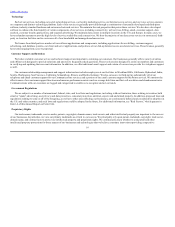Juno 2014 Annual Report Download - page 20
Download and view the complete annual report
Please find page 20 of the 2014 Juno annual report below. You can navigate through the pages in the report by either clicking on the pages listed below, or by using the keyword search tool below to find specific information within the annual report.
Table of Contents
Our social networking and loyalty marketing services rely heavily on email campaigns, and any disruptions or restrictions on the sending of emails or
increase in the associated costs could adversely affect our business, financial condition, results of operations, and cash flows.
Our emails have historically generated the majority of the traffic on our social networking websites and are a key driver of member activity for our
loyalty marketing service. A significant number of members of our social networking and loyalty marketing services elect to opt-out of receiving certain
types of emails. New laws, such as Canada's anti-spam legislation that went into effect in July 2014, may impact our ability to email some of our members, the
types of emails we send to them or the content that we include in our emails to them. Without the ability to email these members, we have very limited means
of inducing these members to return to our websites and utilize our services. In addition, each month, a significant number of email addresses for members of
our social networking and loyalty marketing services become invalid. This disrupts our ability to email these members and also prevents our social
networking members from being able to contact these members, which is one of the reasons why members use our services. An increase in the number of
members to whom we are not able to send emails, or who elect to not receive, are unable to receive, or do not open, our emails could adversely affect our
business, financial condition, results of operations, and cash flows. From time to time, Internet service providers block bulk email transmissions, classify as
"spam" emails that have low opening rates, or otherwise experience technical difficulties that result in our inability to successfully deliver emails to our
members. Certain email service providers, such as Google's Gmail service, segregate marketing and promotional emails from other types of emails, which may
impact the effectiveness of our email campaigns. Google's Gmail service also simplifies the opt-out process by including an "unsubscribe" link at the top of
each marketing email, which allows the consumer to unsubscribe from future marketing emails from the particular marketer without first being redirected to
the marketer's website. Third parties may also block, impose restrictions on, or start to charge for, the delivery of emails through their email systems. Due to
the importance of email to our businesses, any disruption or restriction on the distribution of emails or increase in the associated costs could materially and
adversely affect our business, financial condition, results of operations, and cash flows.
Our intellectual property and proprietary rights are important to our businesses, and such rights may be challenged, invalidated, infringed,
misappropriated or be inadequate for the conduct of our businesses. The inability to protect such rights may adversely affect our business, financial
condition, results of operations, and cash flows.
Our trade names, trademarks, service marks, patents, copyrights, domain names, trade secrets, and other intellectual property are important to the success
of our businesses. In particular, we view our primary trademarks as critical to our success. We principally rely upon patent, trademark, copyright, trade secret,
and domain name laws in the U.S. and similar laws in other countries, as well as licenses and other agreements with our employees, members, consumers,
suppliers, and other parties, to establish and maintain our intellectual property and proprietary rights in the technology, services, products, and content used
in our operations. These laws and agreements may not guarantee that our proprietary rights will be protected and our intellectual property and proprietary
rights could be challenged or invalidated. We have applied for the registration of, and have been issued, trademark registrations for trademarks and service
marks used in our businesses in the U.S. and various foreign countries; however, there could be certain pre-existing and potentially conflicting trademark
registrations held by third parties. The steps we have taken to obtain and to protect our intellectual property and proprietary rights may not be adequate, and
other third parties may infringe or misappropriate our intellectual property and proprietary rights. This could have a material adverse effect on our business,
financial condition, results of operations, and cash flows. Furthermore, the validity, enforceability, and scope of protection of intellectual property in
Internet-related industries are uncertain and still evolving. The protection of our intellectual property and proprietary rights may require the expenditure of
significant financial and internal resources. We cannot assure you that we
19
























